Latest Sheet Music
Diana Krall

Diana Jean Krall, (born November 16, 1964) is a Canadian jazz pianist and singer.
Krall was born into a musical family in Nanaimo, British Columbia, Canada. She began learning the piano at the age of four. In high school, she started playing in a small jazz group. When she was 15 she started playing regularly in several Nanaimo restaurants.
At age seventeen she won a scholarship from the Vancouver International Jazz Festival to study at the Berklee College of Music in Boston, and completed three terms.
In Nanaimo her playing attracted the attention of famed bass player Ray Brown (ex-husband of the late Ella Fitzgerald, long-time member of the Oscar Peterson Trio and Grammy-winning composer) and drummer Jeff Hamilton. After hearing her play, Brown and Hamilton persuaded Krall to move to Los Angeles, and study with pianist Jimmy Rowles, with whom she began to sing. This also brought her into contact with influential teachers and producers. In 1990, Krall relocated to New York.
Krall was born into a musical family in Nanaimo, British Columbia, Canada. She began learning the piano at the age of four. In high school, she started playing in a small jazz group. When she was 15 she started playing regularly in several Nanaimo restaurants.
At age seventeen she won a scholarship from the Vancouver International Jazz Festival to study at the Berklee College of Music in Boston, and completed three terms.
In Nanaimo her playing attracted the attention of famed bass player Ray Brown (ex-husband of the late Ella Fitzgerald, long-time member of the Oscar Peterson Trio and Grammy-winning composer) and drummer Jeff Hamilton. After hearing her play, Brown and Hamilton persuaded Krall to move to Los Angeles, and study with pianist Jimmy Rowles, with whom she began to sing. This also brought her into contact with influential teachers and producers. In 1990, Krall relocated to New York.
Cole Porter

Cole Albert Porter (June 9, 1891 – October 15, 1964) was an American composer and songwriter. His works include the musical comedies Kiss Me, Kate, Fifty Million Frenchmen, DuBarry Was a Lady and Anything Goes, as well as songs like "Night and Day", "I Get a Kick out of You", "Well, Did You Evah!" and "I've Got You Under My Skin". He was noted for his sophisticated, bawdy lyrics, clever rhymes and complex forms. Porter was one of the greatest contributors to the Great American Songbook. Cole Porter is one of the few Tin Pan Alley composers to have written both the lyrics and the music for his songs.
Keith Emerson

Keith Noel Emerson (2 November 1944 – 11 March 2016) was an English keyboardist, songwriter, and composer. He played keyboards in a number of bands before finding his first commercial success with the Nice in the late 1960s. He became internationally famous for his work with the Nice, which included writing rock arrangements of classical music. After leaving the Nice in 1970, he was a founding member of Emerson, Lake & Palmer (ELP), one of the early progressive rock supergroups.
Bill Haley

William John Clifton Haley (/ˈheɪli/; July 6, 1925 – February 9, 1981) was a pioneering American rock and roll musician. He is credited by many with first popularizing this form of music in the early 1950s with his group Bill Haley & His Comets and million-selling hits such as "Rock Around the Clock", "See You Later, Alligator", "Shake, Rattle and Roll", "Rocket 88", "Skinny Minnie", and "Razzle Dazzle", and has sold over 60 million records worldwide
Duy Quang

Duy Quang (November 4, 1950 – December 19, 2012) real name Pham Duy Quang was a Vietnamese singer and songwriter. He is considered one of the outstanding singers of Vietnamese new music of the second generation, with a sweet and emotional voice.
Harry Bannink
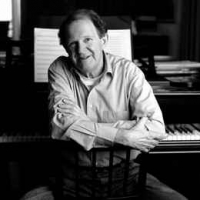
Harry Bannink was a Dutch composer, arranger and pianist. He wrote over 3,000 songs. Bannink studied at the Royal Conservatory in The Hague, receiving his degree in 1946. He started his musical career in the late fifties, when he joined a small dance-orchestra as pianist.
Yiruma

Yiruma (born February 15 1978, Seoul, Korea) is a South Korean piano music composer. He is married to Son Hye-im.
Yiruma is well-known throughout the world, and his albums are sold all over Asia, as well as the United States and Europe. His most famous pieces are "Kiss the Rain", and also "River Flows in You". These pieces are widely mistaken for being associated with the movie Twilight. Although he formerly held dual citizenship as a citizen of the United Kingdom and South Korea, in July 2006 he gave up his British citizenship and entered the Republic of Korea Navy to begin his military service, which is compulsory for all male South Koreans. He has lived in Osaka, Japan for 5 years to promote album sales before giving up his dual citizenship.
Yiruma is well-known throughout the world, and his albums are sold all over Asia, as well as the United States and Europe. His most famous pieces are "Kiss the Rain", and also "River Flows in You". These pieces are widely mistaken for being associated with the movie Twilight. Although he formerly held dual citizenship as a citizen of the United Kingdom and South Korea, in July 2006 he gave up his British citizenship and entered the Republic of Korea Navy to begin his military service, which is compulsory for all male South Koreans. He has lived in Osaka, Japan for 5 years to promote album sales before giving up his dual citizenship.
Michel Petrucciani

Michel Petrucciani (December 28, 1962, Orange, France – January 6, 1999, New York City, USA), was a French jazz pianist.
Michel Petrucciani came from an Italo-French family with a musical background. His father Tony played guitar, his brother Louis played bass and his last brother Philippe plays guitar too. Michel was born with osteogenesis imperfecta, which is a genetic disease that causes brittle bones and in his case short stature. It is also often linked to pulmonary ailments. In his early career his father and brother occasionally carried him, literally, because he could not walk far on his own unaided. In certain respects though he considered it an advantage as it got rid of distractions, like sports, that other boys tended to become involved in.
At an early age he became an enthusiast of Duke Ellington and wished to become a pianist like him. Although he trained for years as a classical pianist, jazz remained his main interest. He gave his first professional concert at 13. At this point in his life he was still quite fragile and had to be carried to and from the piano. His size meant that he required aids to reach the piano's pedals, but his hands were average in length. This had its advantages, however: at the start of his career Petrucciani's manager would often smuggle him into hotel rooms in a suitcase in a bid to save money. By the age of 18 he was part of a successful trio. He moved to the US in 1982, where he successfully encouraged Charles Lloyd to resume playing actively. On February 22, 1985, with Petrucciani cradled in his arms, Lloyd walked onto the stage at Town Hall in New York City and sat him on his piano stool for what would be an historic evening in jazz history: the filming of One Night with Blue Note. The film's director John Jopson would later recall in the reissued liner notes that the moment moved him to tears. In 1986 Petrucciani recorded a live album with Wayne Shorter and Jim Hall. He also played with diverse figures in the US jazz scene including Dizzy Gillespie.
Michel Petrucciani came from an Italo-French family with a musical background. His father Tony played guitar, his brother Louis played bass and his last brother Philippe plays guitar too. Michel was born with osteogenesis imperfecta, which is a genetic disease that causes brittle bones and in his case short stature. It is also often linked to pulmonary ailments. In his early career his father and brother occasionally carried him, literally, because he could not walk far on his own unaided. In certain respects though he considered it an advantage as it got rid of distractions, like sports, that other boys tended to become involved in.
At an early age he became an enthusiast of Duke Ellington and wished to become a pianist like him. Although he trained for years as a classical pianist, jazz remained his main interest. He gave his first professional concert at 13. At this point in his life he was still quite fragile and had to be carried to and from the piano. His size meant that he required aids to reach the piano's pedals, but his hands were average in length. This had its advantages, however: at the start of his career Petrucciani's manager would often smuggle him into hotel rooms in a suitcase in a bid to save money. By the age of 18 he was part of a successful trio. He moved to the US in 1982, where he successfully encouraged Charles Lloyd to resume playing actively. On February 22, 1985, with Petrucciani cradled in his arms, Lloyd walked onto the stage at Town Hall in New York City and sat him on his piano stool for what would be an historic evening in jazz history: the filming of One Night with Blue Note. The film's director John Jopson would later recall in the reissued liner notes that the moment moved him to tears. In 1986 Petrucciani recorded a live album with Wayne Shorter and Jim Hall. He also played with diverse figures in the US jazz scene including Dizzy Gillespie.
Sting

Gordon Matthew Thomas Sumner, CBE (born October 2, 1951), better known by his stage name Sting, is a three time Academy Award-nominated and multiple Grammy-winning English musician from Wallsend in North Tyneside. Prior to starting his solo career, he was the principal songwriter, lead singer and bassist of the rock band The Police. As a solo musician and member of The Police, Sting has sold over 100 million records, and received over sixteen Grammy Awards for his work, receiving his first Grammy for Best Rock Instrumental Performance in 1981, and receiving an Oscar nomination for best song.
Sting has stated that he gained his nickname while with the Phoenix Jazzmen. He once performed wearing a black and yellow sweater with hooped stripes that bandleader Gordon Solomon had noted made him look like a bumblebee; thus Sumner became "Sting". He uses Sting almost exclusively, except on official documents. In a press conference filmed in the movie Bring on the Night, he jokingly stated when referred to by a journalist as Gordon, "My children call me Sting, my mother calls me Sting, who is this Gordon character?"
Sting has stated that he gained his nickname while with the Phoenix Jazzmen. He once performed wearing a black and yellow sweater with hooped stripes that bandleader Gordon Solomon had noted made him look like a bumblebee; thus Sumner became "Sting". He uses Sting almost exclusively, except on official documents. In a press conference filmed in the movie Bring on the Night, he jokingly stated when referred to by a journalist as Gordon, "My children call me Sting, my mother calls me Sting, who is this Gordon character?"
Brahms

Johannes Brahms (May 7, 1833 â April 3, 1897) was a German composer of the Romantic period. He was born in Hamburg and in his later years he settled in Vienna, Austria.
Brahms maintained a Classical sense of form and order in his works â in contrast to the opulence of the music of many of his contemporaries. Thus many admirers (though not necessarily Brahms himself) saw him as the champion of traditional forms and "pure music," as opposed to the New German embrace of program music.
Brahms venerated Beethoven: in the composer's home, a marble bust of Beethoven looked down on the spot where he composed, and some passages in his works are reminiscent of Beethoven's style. The main theme of the finale of Brahms's First Symphony is reminiscent of the main theme of the finale of Beethoven's Ninth, and when this resemblance was pointed out to Brahms he replied that any ass â jeder Esel â could see that.
Ein deutsches Requiem was partially inspired by his mother's death in 1865, but also incorporates material from a Symphony he started in 1854, but abandoned following Schumann's suicide attempt. He once wrote that the Requiem "belonged to Schumann". The first movement of this abandoned Symphony was re-worked as the first movement of the First Piano Concerto.
Brahms also loved the Classical composers Mozart and Haydn. He collected first editions and autographs of their works, and edited performing editions. He also studied the music of pre-classical composers, including Giovanni Gabrieli, Johann Adolph Hasse, Heinrich Schütz and especially Johann Sebastian Bach. His friends included leading musicologists, and with Friedrich Chrysander he edited an edition of the works of François Couperin. He looked to older music for inspiration in the arts of strict counterpoint; the themes of some of his works are modelled on Baroque sources, such as Bach's The Art of Fugue in the fugal finale of Cello Sonata No. 1, or the same composer's Cantata No. 150 in the passacaglia theme of the Fourth Symphony's finale.
Brahms maintained a Classical sense of form and order in his works â in contrast to the opulence of the music of many of his contemporaries. Thus many admirers (though not necessarily Brahms himself) saw him as the champion of traditional forms and "pure music," as opposed to the New German embrace of program music.
Brahms venerated Beethoven: in the composer's home, a marble bust of Beethoven looked down on the spot where he composed, and some passages in his works are reminiscent of Beethoven's style. The main theme of the finale of Brahms's First Symphony is reminiscent of the main theme of the finale of Beethoven's Ninth, and when this resemblance was pointed out to Brahms he replied that any ass â jeder Esel â could see that.
Ein deutsches Requiem was partially inspired by his mother's death in 1865, but also incorporates material from a Symphony he started in 1854, but abandoned following Schumann's suicide attempt. He once wrote that the Requiem "belonged to Schumann". The first movement of this abandoned Symphony was re-worked as the first movement of the First Piano Concerto.
Brahms also loved the Classical composers Mozart and Haydn. He collected first editions and autographs of their works, and edited performing editions. He also studied the music of pre-classical composers, including Giovanni Gabrieli, Johann Adolph Hasse, Heinrich Schütz and especially Johann Sebastian Bach. His friends included leading musicologists, and with Friedrich Chrysander he edited an edition of the works of François Couperin. He looked to older music for inspiration in the arts of strict counterpoint; the themes of some of his works are modelled on Baroque sources, such as Bach's The Art of Fugue in the fugal finale of Cello Sonata No. 1, or the same composer's Cantata No. 150 in the passacaglia theme of the Fourth Symphony's finale.
Dave Weckl

Weckl attended Francis Howell High School in St. Charles, Missouri, and graduated in 1978. He majored in jazz studies at the University of Bridgeport in Connecticut. Starting out on the New York fusion scene in the early 1980s, Weckl soon began working with artists such as Paul Simon, Madonna, George Benson, Michel Camilo, Robert Plant and Anthony Jackson. His most famous early work though, where his popularity blossomed, was with the Chick Corea Elektric Band from 1985 to 1991.[citation n
Billy Joel

William Martin Joel (born May 9, 1949) is an American pianist and singer-songwriter. He released his first hit song, "Piano Man", in 1973. According to the RIAA, he is the sixth best-selling recording artist in the United States.
Joel had Top 10 hits in the '70s, '80s, and '90s; is a six-time Grammy Award winner, and has sold in excess of 150 million albums worldwide. He was inducted into the Songwriter's Hall of Fame (Class of 1992), the Rock and Roll Hall of Fame (Class of 1999), and the Long Island Music Hall of Fame (Class of 2006). Joel "retired" from recording pop music in 1993 but continued to tour (sometimes with Elton John). In 2001 he subsequently released Fantasies & Delusions, a CD of classical compositions for piano. In 2007 he returned to recording with a single entitled "All My Life," followed by an extensive "World Tour" from 2006-2008, covering many of the major world cities.
Joel had Top 10 hits in the '70s, '80s, and '90s; is a six-time Grammy Award winner, and has sold in excess of 150 million albums worldwide. He was inducted into the Songwriter's Hall of Fame (Class of 1992), the Rock and Roll Hall of Fame (Class of 1999), and the Long Island Music Hall of Fame (Class of 2006). Joel "retired" from recording pop music in 1993 but continued to tour (sometimes with Elton John). In 2001 he subsequently released Fantasies & Delusions, a CD of classical compositions for piano. In 2007 he returned to recording with a single entitled "All My Life," followed by an extensive "World Tour" from 2006-2008, covering many of the major world cities.
Sigur Ros

Sigur Rós (pronounced sigur rous with emphasis on first letters); is an Icelandic post-rock band that uses melodic, classical and minimalist elements. The group is particularly noted for their overhead voices and vocalist Jónsi's falsetto. Múm and Amiina can easily be counted among the groups that make music by being influenced by the group. All of these bands have evolved from Iceland's creative and colorful music scene.
Vincent d'Indy
Paul Marie Théodore Vincent d'Indy (French: ; 27 March 1851 – 2 December 1931) was a French composer and teacher.Paul Marie Théodore Vincent d'Indy was born in Paris into an aristocratic family of royalist and Catholic persuasion. He had piano lessons from an early age from his paternal grandmother, who passed him on to Antoine François Marmontel and Louis Diémer.
Floyd Cramer
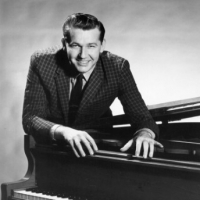
Floyd Cramer was an American pianist who was inducted into both the Country Music Hall of Fame and the Rock and Roll Hall of Fame. His signature playing style was a cornerstone of the pop-oriented "Nashville sound" of the 1950s and 1960s.
Glenn Miller Orchestra
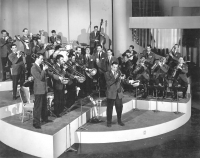
This article is about the band that Glenn Miller fronted. For the band that performed after his disappearance, see Glenn Miller Orchestra (1956–present).
Glenn Miller and His Orchestra
Glenn Miller Band.jpg
Glenn Miller and His Orchestra, on the set of Sun Valley Serenade, 1941
Background information
Genres Dance band, Swing
Years active April 1938 – September 1942
Labels
Bluebird Victor
Website www.glennmiller.com
Past members see members section
Glenn Miller and His Orchestra was an American swing dance band formed by Glenn Miller in 1938. Arranged around a clarinet and tenor saxophone playing melody, and three other saxophones playing harmony, the band became the most popular and commercially successful dance orchestra of the Swing era and one of the greatest singles charting acts of the 20th century.
Miller began professionally recording in New York City as a sideman in the Hot jazz era of the late 1920s. With the arrival of virtuoso trombonists Jack Teagarden and Tommy Dorsey, Miller focused more on developing his arrangement skills. Writing for contemporaries and future stars such as Artie Shaw, and Benny Goodman, Miller gained prowess as an arranger by working in a variety of settings. Later, Miller largely improved his arranging and writing skills by studying under music theorist Joseph Schillinger.
In February 1937, Miller started an orchestra that briefly made records for Decca. With this group, Miller used an arrangement he wrote for British bandleader Ray Noble's American band in an attempt to form a clarinet-reed sound. This style developed over time, and eventually became known as the Glenn Miller sound. Frustrated with his agency over playing inconsistent bookings and lacking broad radio exposure, Miller gave the band notice in December 1937. Less than three months later, he was looking for members and forming a new band.
Miller began a partnership with Eli Oberstein, which led directly to a contract with Victor subsidiary Bluebird Records. Gaining notoriety at such engagements as the Paradise Restaurant and Frank Dailey–owned Meadowbrook and their corresponding nationwide broadcasts, Miller struck enormous popularity playing the Glen Island Casino in the summer of 1939. From late 1939 to mid-1942, Miller was the number-one band in the country, with few true rivals. Only Harry James' band began to equal Miller's in popularity as he wound down his career in the wake of the Second World War. The AFM strike prevented Miller from making any new recordings in the last two months of his band's existence, and they formally disbanded at the end of September 1942.
Miller's short-term chart successes have seldom been duplicated and his group's unprecedented dominance of early Your Hit Parade and Billboard singles charts, resulting in 16 number-one singles and 69 Top Ten hits, foreshadowed future record-breaking chart acts such as Elvis Presley and The Beatles.
Contents
1 Musical success
1.1 Beginnings
1.2 Glen Island Casino and Meadowbrook
1.3 Nationwide popularity
2 Radio success
3 Chart success
4 Past members
5 Discography
5.1 Singles
6 See also
7 References
8 External links
Musical success
Beginnings
By March 1938, Glenn was planning to form a new group. The newly reformed band featured several longtime associates of Miller. From his first orchestra, Miller invited back Hal McIntyre, and hired Paul Tanner, Wilbur Schwartz, Ray Eberle (who was the younger brother of Jimmy Dorsey's vocalist Bob Eberly), and his old friend Chummy MacGregor. Miller's perseverance, business expertise, combined with a penchant for showmanship and musical taste, provided the faith for financiers Mike Nidorf and Cy Shribman. Miller used the 'clarinet-lead' sound as the foundation for his new band, and this caught the attention of students at Northeastern campuses. They opened on April 16, 1938, at Raymor Ballroom in Boston. When the band reached New York, they were billed below Freddie Fisher and His Schnickelfritzers, a dance band comedy routine. From Vincent Lopez's group came Marion Hutton, who added enthusiasm and energy in her performances. On September 7, 1938, the band made their first recordings, "My Reverie", "King Porter Stomp" and "By the Waters of Minnetonka", in two parts. Keeping up radio dates, Miller was only booked for 1 more session the rest of the year.
Glen Island Casino and Meadowbrook
In March 1939, the Glenn Miller Orchestra was given its big break, when they were chosen to play the summer season at the prestigious Glen Island Casino located on the north shore of Long Island Sound in New Rochelle, New York. Frank Dailey, manager of The Meadowbrook Ballroom in Cedar Grove, New Jersey, immediately booked the band for a four-week stay in March and April, before Glen Island. The band was well-received and within days Dailey picked up a three-week extension offer. During this time, Bluebird recording dates became more common and Glenn added drummer Maurice Purtill and trumpeter Dale "Mickey" McMickle to stabilize personnel. Opening at Glen Island on May 17, 1939, the casino's radio broadcast antenna ensured the Miller band was heard around the country. In late August, the end of their summer season, they had nationwide attention.
George T. Simon, writer and one-time drummer for Miller, spoke of the Glen Island broadcasts:
Glen Island was the prestige place for people who listened to bands on radio. The band's first semi hit, "Little Brown Jug", came out just when it opened at Glen Island. That helped. And the clarinet lead in Glenn's arrangements was such a romantic sound! It caught the public fancy during this exposure. Miller began ending his broadcasts from Glen Island with his "Something Old, Something New" medleys. But the most important thing for Glenn's success was that he recorded "In the Mood" while he was at the casino. That made him the Michael Jackson of his day.
Nationwide popularity
Capitalizing on newfound popularity, Miller decided to add a trombone and a trumpet, giving the band a fuller sound. On April 4, 1939, Miller and his orchestra recorded "Moonlight Serenade". Considered one of the top songs of the swing era, and Miller's best composition, it soon became the theme song to start and end all of his radio performances.
Miller's most popular track "In the Mood" was recorded August 1, 1939. Famous for its opening and bass riffs as well as its "dueling" saxophone solos between Tex Beneke and Al Klink, the song hit number one on the Billboard charts, staying for a total of 30 weeks. Joe Garland compiled the song from riffs he'd heard in other songs, and is credited on the label. Elements of "In the Mood" can be found in earlier jazz recordings, such as Jimmy O'Bryant's "Clarinet Getaway", Wingy Manone's "Tar Paper Stomp", and Fletcher Henderson's "Hot and Anxious." Garland put these pieces together and initially offered the song, in a six-minute form, to Artie Shaw. Despite playing it for radio broadcast, Shaw found no success with it in this form. Miller purchased the song in June 1939 and asked Eddie Durham to arrange it for his orchestra, and Miller made final tweaks in Victor studios. In a 2000 interview for npr, trombonist Paul Tanner remembered recording the song and playing it live:
He would say, "You fellas do this, and you fellas do that, and let's hear it once." And then, "We're gonna cut from this spot to this spot in the arrangement, and in here we're gonna put a trumpet solo. And in this spot and this spot we're gonna cut way down here and we're gonna have the two saxophones have a little battle in there," and decided to make cuts. And then at the end, Alice , if you know the arrangement, at the end there are all those false endings that go on, and it kept getting softer and softer until Glenn would give the drummer a clue and he would hit the cowbell and then we would know that the next time we were to come on very loud. And the dancers just loved it. He tried it out on the dances at the Glen Island Casino, and they loved it. They couldn't figure out how we knew when to come in loud. But, you know, I told them, "Well, we have a sixth sense of that sort of thing." But actually, what happened is the drummer hit the cowbell, and we knew the next time was loud. And this was all Glenn's doing.
On February 5, 1940, Miller recorded "Tuxedo Junction", which hit number one and reportedly sold 115,000 copies within the first week of release, and placed 7th overall for the National Hit Parade that year. Bob Eberly said that it "sold 90,000 copies in the first week, at a time when 25,000 was considered a great seller". In April, the band chant track "Pennsylvania 6-5000", referencing the phone number for the Hotel Pennsylvania, which housed the Café Rouge, a common engagement and broadcasting spot for the band, was released and it too became an instant swing standard.
On January 1, 1941, following tensions regarding licensing fees, radio networks banned ASCAP songs from live performance. Miller had to work to reform his radio programs for BMI published tunes, temporarily switching his theme to "Slumber Song". In early 1941, Marion Hutton left the band to go on maternity leave. In the meantime, Miller needed an additional female vocalist, and he offered Dorothy Claire, then with Bobby Byrne's band, twice her salary. Claire went to work for Miller, despite her signature on a three-year contract with Byrne in November 1940, and Miller ignored Byrne's wishes for compensation. Byrne then launched a $25,000 lawsuit against the Miller orchestra's business dealings. Miller met with Byrne in Columbus, Ohio sometime in early March and settled the dispute – Claire went back to working with Byrne's band. Miller soon hired The Modernaires from Paul Whiteman, who was disbanding his orchestra. Still in need of a female vocalist, the wife of Modernaire Hal Dickinson, Paula Kelly, who had sung previously with Al Donahue, stepped up to fill in the role. The signing of the Modernaires significantly benefitted the Miller organization. Hip and popular with young listeners, the Modernaires' vocal range added a new dimension to Miller's recordings.
In late March, Miller and his orchestra began work on their first motion picture, Sun Valley Serenade. Previously, swing films such as Hollywood Hotel with Benny Goodman's orchestra had only featured bands for song performances; Miller reportedly insisted, perhaps even to the extent of contract clauses, that the plot of Sun Valley revolve around the band rather than only feature them. Harry Warren and Mack Gordon were commissioned to write songs for the film. The Miller band filmed and recorded an extended song-and-dance number featuring the Nicholas Brothers for what was soon to be its biggest selling record, surprise hit "Chattanooga Choo Choo". Despite criticism of the plot, Sun Valley Serenade was received with general positivity from critics, and Miller earned praise for his band's role in the film, with Barry Ulanov writing for Metronome:
Miller comes across as a convincing band leader, and, even more important, a convincing human being in this film. He’s on mostly for music, but most of the film is music and the dozen or so reels are a better showcase for the Glenn Miller band than they are for the Sonja Henie torso and limbs, with and without skates. Never has a movie made more of a popular band and never has a movie featuring such an organization presented its music so tastefully... Pictorially, Trigger Alpert and Maurice Purtill take the honors. Trigger hops around like mad and Maurice looks like the movies’ idea of a swing drummer, all right. They stay within the bounds of good taste, however ... the story is believable, and happily centers around the band, so that the whole thing is a triumph for Glenn Miller and the band.
Billboard top 10 chart for January 24, 1942, where Glenn Miller and His Orchestra hold five of the slots.
In October, ASCAP and the radio networks agreed on a new rate, and the band could finally play "Chattanooga" and their other songs on radio. W. Wallace Early, the manager of record sales for RCA Victor and Bluebird Records, presented the first ever gold record to Miller on February 10, 1942, saying:
It's a pleasure to be here tonight. And speaking of RCA Victor, we're mighty proud of that Chattanooga Choo Choo, and the man that made the record, Glenn Miller. You see it's been a long time – 15 years in fact – since any record has sold a million copies. And Chattanooga Choo Choo certainly put on steam and breezed right through that million mark by over 200,000 pressings. And we decided that Glenn should get a trophy. The best one we could think of is a gold record of Chattanooga. And now Glenn, it's yours – with the best wishes of RCA Victor Bluebird Records.
After the Pearl Harbor attack, Miller began incorporating more patriotic themes into his radio shows and recordings.
In early 1942, the band was upgraded from Bluebird to full-price Victor Records. Following very closely in the footsteps of its predecessor, the Miller band started work on their second film, Orchestra Wives in March. Once again, Gordon and Warren were recalled to compose the songs. The previous year, both had composed "At Last" but couldn't place it into Sun Valley Serenade. They worked over the arrangement, and it was displayed prominently in Orchestra Wives. Years later, it became a standard when recorded by Etta James. Akin to "Chattanooga", "(I've Got a Gal In) Kalamazoo" was filmed as a song and dance number featuring the Nicholas Brothers and also sold a million pressings, with Billboard ranking it among the most popular records of the year.
In mid–July, Miller and the band recorded thirteen sides, as James Petrillo, chief of the musicians' union, embarked on a 28-month recording ban. The strike prevented Miller from making additional records in his career, although Victor slowly released the last set of tracks, with "That Old Black Magic" hitting number one in May 1943, over eight months after his band ceased to exist.
Miller began privately sending letters to the Armed Forces in attempts to lead a modern military band. Accepted into the United States Navy and later transferred to the Army Air Forces, in early September he broke the news to the band and later that month they played their last radio shows. Miller surrendered his Chesterfield radio slot to Harry James.
Radio success
Radio played a pivotal role in the success of Miller and His Orchestra. Featured heavily on the format during their existence, many of their earlier programs from such venues as the Paradise Restaurant, Glen Island and the Meadowbrook Ballroom used remote connections to the National Broadcasting Company, on both NBC–Red and NBC–Blue.
The makers of Chesterfield Cigarettes hosted a half-hour radio show on CBS that featured King of Jazz Paul Whiteman. Whiteman decided to retire and recommended Glenn as a replacement. On December 27, 1939, Miller took over the program as Chesterfield Moonlight Serenade. During the first 13 weeks, The Andrews Sisters were featured as Chesterfield were worried over whether Miller could sustain his popularity. Their fear subsided, and the program, reformatted for 15 minutes, aired Tuesday, Wednesday and Thursday nights at 10:15pm. Miller and his band held the slot until their disbandment in 1942.
In 1940, the band broadcast from the first time from the Café Rouge at the Hotel Pennsylvania, soon to become a regular booking and a host of long-term engagements. By then, the Miller band had several NBC sustaining broadcasts in addition to three CBS programs, reaching American homes 6–7 days a week. In August, Miller's orchestra had an hour-long program on NBC–Blue, Glenn Miller's Sunset Serenade featuring prizes Miller paid for out-of-pocket. A review in Billboard commented, "Unusual length of the program allows Miller to display all the top items in his library."
Chart success
According to Paul Albone, of the 121 singles by Glenn Miller and His Orchestra that made the charts, 69 were Top Ten hits, and 16 reached number-one. In just a 4-year career, Miller and His Orchestra's songs spent a cumulative total of 664 weeks, nearly thirteen years, on the charts, 79 of which were at the number-one position. Miller also has the distinction of three posthumous albums reaching number-one on Billboard charts: Glenn Miller in 1945, its follow-up in 1947, and his original recordings repackaged for the release of The Glenn Miller Story in 1954.
Past members
Ray Anthony, who played trumpet with the band from 1940 to 1941, is the last surviving member as of 2019.
Discography
See also: Glenn Miller discography
Singles
Million-selling singles:
1939: "Little Brown Jug"
1939: "Moonlight Serenade"
1939: "In the Mood"
1940: "Tuxedo Junction"
1940: "Pennsylvania 6-5000"
1941: "Chattanooga Choo Choo"
1941: "A String of Pearls"
1941: "Moonlight Cocktail"
1942: "American Patrol"
1942: "(I've Got a Gal In) Kalamazoo"
See also
Glenn Miller
Swing music
Bandleader
Big band
References
"A Portrait of Glenn Miller" (PDF). www.colorado.edu. Glenn Miller Archive.
Gilliland, John (1994). Pop Chronicles the 40s: The Lively Story of Pop Music in the 40s (audiobook). ISBN 978-1-55935-147-8. OCLC 31611854. Tape 2, side A.
"Top Ten Hits 1939-1943" (PDF). colorado.edu. Glenn Miller Archive. September 2017. Retrieved October 12, 2018.
"Captain Swing - Glenn Miller - America in WWII magazine". www.americainwwii.com.
"A Bluebird Reverie – The First RCA Session". 1 April 2014.
Settlemier, Tyrone. "The Online 78 rpm Discographical Project". www.78discography.com.
"POP/JAZZ; GLENN MILLER SOUND OF 1939 AT GLEN ISLAND CASINO".
"Glenn Miller Orchestra – History". glennmillerorchestra.com.
http://ww Archived 2013-07-12 at the Wayback Machine w.glennmiller.com/index.php
"Army Band Hits High Note With Community".
Tsort. "Song title 150 - In the Mood". tsort.info.
""In the Mood"—Glenn Miller (1939)" (PDF). Library of Congress.
Spragg, Dennis. "In the Mood" (PDF). www.colorado.edu. Glenn Miller Archive.
"'In the Mood'". National Public Radio.
Simon, George T. Glenn Miller and His Orchestra. NY: Crowell, 1974.
Spragg, Dennis. "Sun Valley Serenade 75th Anniversary Commemoration" (PDF). Glenn Miller Archive.
Crowther, Bosley. "Sonia Henie in 'Sun Valley Serenade,' a Sparkling and Melodious Outdoor Picture, at the Roxy". The New York Times.
Murrells, Joseph (1978). The Book of Golden Discs (2nd ed.). London: Barrie and Jenkins Ltd. p. 4. ISBN 0-214-20512-6.
"Radio Recordings" (PDF). colorado.edu. Glenn Miller Archive.
Carter, Dick (January 3, 1942). "On the Air: Glenn Miller". Billboard. Retrieved 26 October 2014.
Whitburn, Joel. Pop Memories (1900-1940). Record Research.
Whitburn, Joel (2015). Pop Hits Singles and Albums, 1940-1954. Record Research. ISBN 978-0-89820-198-7.
Popa, Christopher. "Record Sales". Big Band Library.
External links
Wikimedia Commons has media related to Glenn Miller Orchestra.
Website of past vocalist Eileen Burns
YouTube Videos from 1983 GMO US and Japan Tour
vte
Glenn Miller and His Orchestra
Discography Timeline of members, 1938–1942
Number one hits
1939
"Wishing (Will Make It So)" "Stairway to the Stars" "Moon Love" "Over the Rainbow" "The Man With the Mandolin" "Blue Orchids" "In the Mood"
1940
"Tuxedo Junction" "The Woodpecker Song"
1941
"Song of the Volga Boatmen" "Chattanooga Choo Choo" "Elmer's Tune"
1942
"A String of Pearls" "Moonlight Cocktail" "(I've Got a Gal In) Kalamazoo"
1943
"That Old Black Magic"
Albums
Up Swing (1944) Smoke Rings (1944) Glenn Miller (1945) Glenn Miller Masterpieces, Volume II (1947) Glenn Miller Plays Selections From the Film "The Glenn Miller Story" (1954) The Glenn Miller Carnegie Hall Concert (1958) Pure Gold (1975)
Members
Vocalists
Marion Hutton Ray Eberle Tex Beneke Jack Lathrop Ernie Caceres Kay Starr Dorothy Claire Paula Kelly The Modernaires Skip Nelson
Musicians
Al Klink Al Mastren Paul Tanner Toby Tyler Tommy Mack Frank D’Annolfo Howard Gibeling Jimmy Priddy Wilbur Schwartz Stanley Aronson Hal McIntyre Tex Beneke Ernie Caceres Jimmy Abato Gabe Galinas Hal Tennyson Benny Feman Babe Russin Skip Martin Johnny Austin Lou Mucci Bob Price Charlie Hill Legh Knowles Mickey McMickle Clyde Hurley Johnny Best Zeke Zarchy Charles Frankhauser Billy May Ray Anthony Alec Fila Bill Graham Steve Lipkins Allan Reuss Arthur Ens Dick Fisher Jack Lathrop Bobby Hackett Bill Conway Chummy MacGregor Bob Spangler Cody Sandifer Frankie Carlson Maurice Purtill Rollie Bundock Tony Carlson Trigger Alpert Doc Goldberg
Arrangers
Jerry Gray Bill Finegan Glenn Miller Billy May
Composers
Glenn Miller Harry Warren Mack Gordon
Army Air Force
band alumni
The Crew Chiefs Addison Collins Jr. Johnny Desmond Peanuts Hucko Jack Lathrop Norman Leyden Ray McKinley Artie Malvin Ralph Patt Mel Powell George Siravo Charlie Spivak
Media
Films
Sun Valley Serenade (1941) Orchestra Wives (1942) The Glenn Miller Story (1954)
Publications
125 Jazz Breaks for Trombone (1927) Glenn Miller's Method for Orchestral Arranging (1943)
Related
List of songs written by Glenn Miller Dorsey Brothers Orchestra The Glenn Miller Story (Decca) (1954) Glenn Miller Orchestra (1956–present) Glenn Miller Time
Authority control Edit this at Wikidata
ISNI: 0000 0001 1536 8834 MusicBrainz: 9b87c1f6-23ae-469b-b710-ea5da2d3f848
Glenn Miller and His Orchestra
Glenn Miller Band.jpg
Glenn Miller and His Orchestra, on the set of Sun Valley Serenade, 1941
Background information
Genres Dance band, Swing
Years active April 1938 – September 1942
Labels
Bluebird Victor
Website www.glennmiller.com
Past members see members section
Glenn Miller and His Orchestra was an American swing dance band formed by Glenn Miller in 1938. Arranged around a clarinet and tenor saxophone playing melody, and three other saxophones playing harmony, the band became the most popular and commercially successful dance orchestra of the Swing era and one of the greatest singles charting acts of the 20th century.
Miller began professionally recording in New York City as a sideman in the Hot jazz era of the late 1920s. With the arrival of virtuoso trombonists Jack Teagarden and Tommy Dorsey, Miller focused more on developing his arrangement skills. Writing for contemporaries and future stars such as Artie Shaw, and Benny Goodman, Miller gained prowess as an arranger by working in a variety of settings. Later, Miller largely improved his arranging and writing skills by studying under music theorist Joseph Schillinger.
In February 1937, Miller started an orchestra that briefly made records for Decca. With this group, Miller used an arrangement he wrote for British bandleader Ray Noble's American band in an attempt to form a clarinet-reed sound. This style developed over time, and eventually became known as the Glenn Miller sound. Frustrated with his agency over playing inconsistent bookings and lacking broad radio exposure, Miller gave the band notice in December 1937. Less than three months later, he was looking for members and forming a new band.
Miller began a partnership with Eli Oberstein, which led directly to a contract with Victor subsidiary Bluebird Records. Gaining notoriety at such engagements as the Paradise Restaurant and Frank Dailey–owned Meadowbrook and their corresponding nationwide broadcasts, Miller struck enormous popularity playing the Glen Island Casino in the summer of 1939. From late 1939 to mid-1942, Miller was the number-one band in the country, with few true rivals. Only Harry James' band began to equal Miller's in popularity as he wound down his career in the wake of the Second World War. The AFM strike prevented Miller from making any new recordings in the last two months of his band's existence, and they formally disbanded at the end of September 1942.
Miller's short-term chart successes have seldom been duplicated and his group's unprecedented dominance of early Your Hit Parade and Billboard singles charts, resulting in 16 number-one singles and 69 Top Ten hits, foreshadowed future record-breaking chart acts such as Elvis Presley and The Beatles.
Contents
1 Musical success
1.1 Beginnings
1.2 Glen Island Casino and Meadowbrook
1.3 Nationwide popularity
2 Radio success
3 Chart success
4 Past members
5 Discography
5.1 Singles
6 See also
7 References
8 External links
Musical success
Beginnings
By March 1938, Glenn was planning to form a new group. The newly reformed band featured several longtime associates of Miller. From his first orchestra, Miller invited back Hal McIntyre, and hired Paul Tanner, Wilbur Schwartz, Ray Eberle (who was the younger brother of Jimmy Dorsey's vocalist Bob Eberly), and his old friend Chummy MacGregor. Miller's perseverance, business expertise, combined with a penchant for showmanship and musical taste, provided the faith for financiers Mike Nidorf and Cy Shribman. Miller used the 'clarinet-lead' sound as the foundation for his new band, and this caught the attention of students at Northeastern campuses. They opened on April 16, 1938, at Raymor Ballroom in Boston. When the band reached New York, they were billed below Freddie Fisher and His Schnickelfritzers, a dance band comedy routine. From Vincent Lopez's group came Marion Hutton, who added enthusiasm and energy in her performances. On September 7, 1938, the band made their first recordings, "My Reverie", "King Porter Stomp" and "By the Waters of Minnetonka", in two parts. Keeping up radio dates, Miller was only booked for 1 more session the rest of the year.
Glen Island Casino and Meadowbrook
In March 1939, the Glenn Miller Orchestra was given its big break, when they were chosen to play the summer season at the prestigious Glen Island Casino located on the north shore of Long Island Sound in New Rochelle, New York. Frank Dailey, manager of The Meadowbrook Ballroom in Cedar Grove, New Jersey, immediately booked the band for a four-week stay in March and April, before Glen Island. The band was well-received and within days Dailey picked up a three-week extension offer. During this time, Bluebird recording dates became more common and Glenn added drummer Maurice Purtill and trumpeter Dale "Mickey" McMickle to stabilize personnel. Opening at Glen Island on May 17, 1939, the casino's radio broadcast antenna ensured the Miller band was heard around the country. In late August, the end of their summer season, they had nationwide attention.
George T. Simon, writer and one-time drummer for Miller, spoke of the Glen Island broadcasts:
Glen Island was the prestige place for people who listened to bands on radio. The band's first semi hit, "Little Brown Jug", came out just when it opened at Glen Island. That helped. And the clarinet lead in Glenn's arrangements was such a romantic sound! It caught the public fancy during this exposure. Miller began ending his broadcasts from Glen Island with his "Something Old, Something New" medleys. But the most important thing for Glenn's success was that he recorded "In the Mood" while he was at the casino. That made him the Michael Jackson of his day.
Nationwide popularity
Capitalizing on newfound popularity, Miller decided to add a trombone and a trumpet, giving the band a fuller sound. On April 4, 1939, Miller and his orchestra recorded "Moonlight Serenade". Considered one of the top songs of the swing era, and Miller's best composition, it soon became the theme song to start and end all of his radio performances.
Miller's most popular track "In the Mood" was recorded August 1, 1939. Famous for its opening and bass riffs as well as its "dueling" saxophone solos between Tex Beneke and Al Klink, the song hit number one on the Billboard charts, staying for a total of 30 weeks. Joe Garland compiled the song from riffs he'd heard in other songs, and is credited on the label. Elements of "In the Mood" can be found in earlier jazz recordings, such as Jimmy O'Bryant's "Clarinet Getaway", Wingy Manone's "Tar Paper Stomp", and Fletcher Henderson's "Hot and Anxious." Garland put these pieces together and initially offered the song, in a six-minute form, to Artie Shaw. Despite playing it for radio broadcast, Shaw found no success with it in this form. Miller purchased the song in June 1939 and asked Eddie Durham to arrange it for his orchestra, and Miller made final tweaks in Victor studios. In a 2000 interview for npr, trombonist Paul Tanner remembered recording the song and playing it live:
He would say, "You fellas do this, and you fellas do that, and let's hear it once." And then, "We're gonna cut from this spot to this spot in the arrangement, and in here we're gonna put a trumpet solo. And in this spot and this spot we're gonna cut way down here and we're gonna have the two saxophones have a little battle in there," and decided to make cuts. And then at the end, Alice , if you know the arrangement, at the end there are all those false endings that go on, and it kept getting softer and softer until Glenn would give the drummer a clue and he would hit the cowbell and then we would know that the next time we were to come on very loud. And the dancers just loved it. He tried it out on the dances at the Glen Island Casino, and they loved it. They couldn't figure out how we knew when to come in loud. But, you know, I told them, "Well, we have a sixth sense of that sort of thing." But actually, what happened is the drummer hit the cowbell, and we knew the next time was loud. And this was all Glenn's doing.
On February 5, 1940, Miller recorded "Tuxedo Junction", which hit number one and reportedly sold 115,000 copies within the first week of release, and placed 7th overall for the National Hit Parade that year. Bob Eberly said that it "sold 90,000 copies in the first week, at a time when 25,000 was considered a great seller". In April, the band chant track "Pennsylvania 6-5000", referencing the phone number for the Hotel Pennsylvania, which housed the Café Rouge, a common engagement and broadcasting spot for the band, was released and it too became an instant swing standard.
On January 1, 1941, following tensions regarding licensing fees, radio networks banned ASCAP songs from live performance. Miller had to work to reform his radio programs for BMI published tunes, temporarily switching his theme to "Slumber Song". In early 1941, Marion Hutton left the band to go on maternity leave. In the meantime, Miller needed an additional female vocalist, and he offered Dorothy Claire, then with Bobby Byrne's band, twice her salary. Claire went to work for Miller, despite her signature on a three-year contract with Byrne in November 1940, and Miller ignored Byrne's wishes for compensation. Byrne then launched a $25,000 lawsuit against the Miller orchestra's business dealings. Miller met with Byrne in Columbus, Ohio sometime in early March and settled the dispute – Claire went back to working with Byrne's band. Miller soon hired The Modernaires from Paul Whiteman, who was disbanding his orchestra. Still in need of a female vocalist, the wife of Modernaire Hal Dickinson, Paula Kelly, who had sung previously with Al Donahue, stepped up to fill in the role. The signing of the Modernaires significantly benefitted the Miller organization. Hip and popular with young listeners, the Modernaires' vocal range added a new dimension to Miller's recordings.
In late March, Miller and his orchestra began work on their first motion picture, Sun Valley Serenade. Previously, swing films such as Hollywood Hotel with Benny Goodman's orchestra had only featured bands for song performances; Miller reportedly insisted, perhaps even to the extent of contract clauses, that the plot of Sun Valley revolve around the band rather than only feature them. Harry Warren and Mack Gordon were commissioned to write songs for the film. The Miller band filmed and recorded an extended song-and-dance number featuring the Nicholas Brothers for what was soon to be its biggest selling record, surprise hit "Chattanooga Choo Choo". Despite criticism of the plot, Sun Valley Serenade was received with general positivity from critics, and Miller earned praise for his band's role in the film, with Barry Ulanov writing for Metronome:
Miller comes across as a convincing band leader, and, even more important, a convincing human being in this film. He’s on mostly for music, but most of the film is music and the dozen or so reels are a better showcase for the Glenn Miller band than they are for the Sonja Henie torso and limbs, with and without skates. Never has a movie made more of a popular band and never has a movie featuring such an organization presented its music so tastefully... Pictorially, Trigger Alpert and Maurice Purtill take the honors. Trigger hops around like mad and Maurice looks like the movies’ idea of a swing drummer, all right. They stay within the bounds of good taste, however ... the story is believable, and happily centers around the band, so that the whole thing is a triumph for Glenn Miller and the band.
Billboard top 10 chart for January 24, 1942, where Glenn Miller and His Orchestra hold five of the slots.
In October, ASCAP and the radio networks agreed on a new rate, and the band could finally play "Chattanooga" and their other songs on radio. W. Wallace Early, the manager of record sales for RCA Victor and Bluebird Records, presented the first ever gold record to Miller on February 10, 1942, saying:
It's a pleasure to be here tonight. And speaking of RCA Victor, we're mighty proud of that Chattanooga Choo Choo, and the man that made the record, Glenn Miller. You see it's been a long time – 15 years in fact – since any record has sold a million copies. And Chattanooga Choo Choo certainly put on steam and breezed right through that million mark by over 200,000 pressings. And we decided that Glenn should get a trophy. The best one we could think of is a gold record of Chattanooga. And now Glenn, it's yours – with the best wishes of RCA Victor Bluebird Records.
After the Pearl Harbor attack, Miller began incorporating more patriotic themes into his radio shows and recordings.
In early 1942, the band was upgraded from Bluebird to full-price Victor Records. Following very closely in the footsteps of its predecessor, the Miller band started work on their second film, Orchestra Wives in March. Once again, Gordon and Warren were recalled to compose the songs. The previous year, both had composed "At Last" but couldn't place it into Sun Valley Serenade. They worked over the arrangement, and it was displayed prominently in Orchestra Wives. Years later, it became a standard when recorded by Etta James. Akin to "Chattanooga", "(I've Got a Gal In) Kalamazoo" was filmed as a song and dance number featuring the Nicholas Brothers and also sold a million pressings, with Billboard ranking it among the most popular records of the year.
In mid–July, Miller and the band recorded thirteen sides, as James Petrillo, chief of the musicians' union, embarked on a 28-month recording ban. The strike prevented Miller from making additional records in his career, although Victor slowly released the last set of tracks, with "That Old Black Magic" hitting number one in May 1943, over eight months after his band ceased to exist.
Miller began privately sending letters to the Armed Forces in attempts to lead a modern military band. Accepted into the United States Navy and later transferred to the Army Air Forces, in early September he broke the news to the band and later that month they played their last radio shows. Miller surrendered his Chesterfield radio slot to Harry James.
Radio success
Radio played a pivotal role in the success of Miller and His Orchestra. Featured heavily on the format during their existence, many of their earlier programs from such venues as the Paradise Restaurant, Glen Island and the Meadowbrook Ballroom used remote connections to the National Broadcasting Company, on both NBC–Red and NBC–Blue.
The makers of Chesterfield Cigarettes hosted a half-hour radio show on CBS that featured King of Jazz Paul Whiteman. Whiteman decided to retire and recommended Glenn as a replacement. On December 27, 1939, Miller took over the program as Chesterfield Moonlight Serenade. During the first 13 weeks, The Andrews Sisters were featured as Chesterfield were worried over whether Miller could sustain his popularity. Their fear subsided, and the program, reformatted for 15 minutes, aired Tuesday, Wednesday and Thursday nights at 10:15pm. Miller and his band held the slot until their disbandment in 1942.
In 1940, the band broadcast from the first time from the Café Rouge at the Hotel Pennsylvania, soon to become a regular booking and a host of long-term engagements. By then, the Miller band had several NBC sustaining broadcasts in addition to three CBS programs, reaching American homes 6–7 days a week. In August, Miller's orchestra had an hour-long program on NBC–Blue, Glenn Miller's Sunset Serenade featuring prizes Miller paid for out-of-pocket. A review in Billboard commented, "Unusual length of the program allows Miller to display all the top items in his library."
Chart success
According to Paul Albone, of the 121 singles by Glenn Miller and His Orchestra that made the charts, 69 were Top Ten hits, and 16 reached number-one. In just a 4-year career, Miller and His Orchestra's songs spent a cumulative total of 664 weeks, nearly thirteen years, on the charts, 79 of which were at the number-one position. Miller also has the distinction of three posthumous albums reaching number-one on Billboard charts: Glenn Miller in 1945, its follow-up in 1947, and his original recordings repackaged for the release of The Glenn Miller Story in 1954.
Past members
Ray Anthony, who played trumpet with the band from 1940 to 1941, is the last surviving member as of 2019.
Discography
See also: Glenn Miller discography
Singles
Million-selling singles:
1939: "Little Brown Jug"
1939: "Moonlight Serenade"
1939: "In the Mood"
1940: "Tuxedo Junction"
1940: "Pennsylvania 6-5000"
1941: "Chattanooga Choo Choo"
1941: "A String of Pearls"
1941: "Moonlight Cocktail"
1942: "American Patrol"
1942: "(I've Got a Gal In) Kalamazoo"
See also
Glenn Miller
Swing music
Bandleader
Big band
References
"A Portrait of Glenn Miller" (PDF). www.colorado.edu. Glenn Miller Archive.
Gilliland, John (1994). Pop Chronicles the 40s: The Lively Story of Pop Music in the 40s (audiobook). ISBN 978-1-55935-147-8. OCLC 31611854. Tape 2, side A.
"Top Ten Hits 1939-1943" (PDF). colorado.edu. Glenn Miller Archive. September 2017. Retrieved October 12, 2018.
"Captain Swing - Glenn Miller - America in WWII magazine". www.americainwwii.com.
"A Bluebird Reverie – The First RCA Session". 1 April 2014.
Settlemier, Tyrone. "The Online 78 rpm Discographical Project". www.78discography.com.
"POP/JAZZ; GLENN MILLER SOUND OF 1939 AT GLEN ISLAND CASINO".
"Glenn Miller Orchestra – History". glennmillerorchestra.com.
http://ww Archived 2013-07-12 at the Wayback Machine w.glennmiller.com/index.php
"Army Band Hits High Note With Community".
Tsort. "Song title 150 - In the Mood". tsort.info.
""In the Mood"—Glenn Miller (1939)" (PDF). Library of Congress.
Spragg, Dennis. "In the Mood" (PDF). www.colorado.edu. Glenn Miller Archive.
"'In the Mood'". National Public Radio.
Simon, George T. Glenn Miller and His Orchestra. NY: Crowell, 1974.
Spragg, Dennis. "Sun Valley Serenade 75th Anniversary Commemoration" (PDF). Glenn Miller Archive.
Crowther, Bosley. "Sonia Henie in 'Sun Valley Serenade,' a Sparkling and Melodious Outdoor Picture, at the Roxy". The New York Times.
Murrells, Joseph (1978). The Book of Golden Discs (2nd ed.). London: Barrie and Jenkins Ltd. p. 4. ISBN 0-214-20512-6.
"Radio Recordings" (PDF). colorado.edu. Glenn Miller Archive.
Carter, Dick (January 3, 1942). "On the Air: Glenn Miller". Billboard. Retrieved 26 October 2014.
Whitburn, Joel. Pop Memories (1900-1940). Record Research.
Whitburn, Joel (2015). Pop Hits Singles and Albums, 1940-1954. Record Research. ISBN 978-0-89820-198-7.
Popa, Christopher. "Record Sales". Big Band Library.
External links
Wikimedia Commons has media related to Glenn Miller Orchestra.
Website of past vocalist Eileen Burns
YouTube Videos from 1983 GMO US and Japan Tour
vte
Glenn Miller and His Orchestra
Discography Timeline of members, 1938–1942
Number one hits
1939
"Wishing (Will Make It So)" "Stairway to the Stars" "Moon Love" "Over the Rainbow" "The Man With the Mandolin" "Blue Orchids" "In the Mood"
1940
"Tuxedo Junction" "The Woodpecker Song"
1941
"Song of the Volga Boatmen" "Chattanooga Choo Choo" "Elmer's Tune"
1942
"A String of Pearls" "Moonlight Cocktail" "(I've Got a Gal In) Kalamazoo"
1943
"That Old Black Magic"
Albums
Up Swing (1944) Smoke Rings (1944) Glenn Miller (1945) Glenn Miller Masterpieces, Volume II (1947) Glenn Miller Plays Selections From the Film "The Glenn Miller Story" (1954) The Glenn Miller Carnegie Hall Concert (1958) Pure Gold (1975)
Members
Vocalists
Marion Hutton Ray Eberle Tex Beneke Jack Lathrop Ernie Caceres Kay Starr Dorothy Claire Paula Kelly The Modernaires Skip Nelson
Musicians
Al Klink Al Mastren Paul Tanner Toby Tyler Tommy Mack Frank D’Annolfo Howard Gibeling Jimmy Priddy Wilbur Schwartz Stanley Aronson Hal McIntyre Tex Beneke Ernie Caceres Jimmy Abato Gabe Galinas Hal Tennyson Benny Feman Babe Russin Skip Martin Johnny Austin Lou Mucci Bob Price Charlie Hill Legh Knowles Mickey McMickle Clyde Hurley Johnny Best Zeke Zarchy Charles Frankhauser Billy May Ray Anthony Alec Fila Bill Graham Steve Lipkins Allan Reuss Arthur Ens Dick Fisher Jack Lathrop Bobby Hackett Bill Conway Chummy MacGregor Bob Spangler Cody Sandifer Frankie Carlson Maurice Purtill Rollie Bundock Tony Carlson Trigger Alpert Doc Goldberg
Arrangers
Jerry Gray Bill Finegan Glenn Miller Billy May
Composers
Glenn Miller Harry Warren Mack Gordon
Army Air Force
band alumni
The Crew Chiefs Addison Collins Jr. Johnny Desmond Peanuts Hucko Jack Lathrop Norman Leyden Ray McKinley Artie Malvin Ralph Patt Mel Powell George Siravo Charlie Spivak
Media
Films
Sun Valley Serenade (1941) Orchestra Wives (1942) The Glenn Miller Story (1954)
Publications
125 Jazz Breaks for Trombone (1927) Glenn Miller's Method for Orchestral Arranging (1943)
Related
List of songs written by Glenn Miller Dorsey Brothers Orchestra The Glenn Miller Story (Decca) (1954) Glenn Miller Orchestra (1956–present) Glenn Miller Time
Authority control Edit this at Wikidata
ISNI: 0000 0001 1536 8834 MusicBrainz: 9b87c1f6-23ae-469b-b710-ea5da2d3f848
Peter Cetera
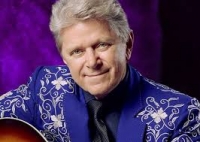
Peter Paul Cetera (/səˈtɛrə/ sə-TERR-ə; born September 13, 1944) is an American singer, songwriter, and bassist best known for being an original member of the rock band Chicago (1967–1985), before launching a successful solo career. His career as a recording artist encompasses seventeen albums with Chicago and eight solo albums.
With "If You Leave Me Now", a song written and sung by Cetera on the group's tenth album, Chicago garnered its first Grammy Award. It was also the group's first number one single
With "If You Leave Me Now", a song written and sung by Cetera on the group's tenth album, Chicago garnered its first Grammy Award. It was also the group's first number one single
Victor Young

Victor Young was an American composer, arranger, violinist and conductor. Born: August 8, 1900, Chicago, Illinois, United States Died: November 10, 1956, Palm Springs, California, United States Spouse: Rita Kinel (m. 1922–1956)
Albums: Themes and Songs from The Quiet Man,
Albums: Themes and Songs from The Quiet Man,
Domenico Scarlatti
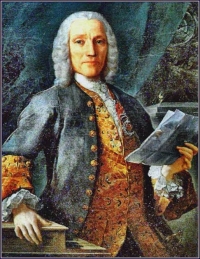
Giuseppe Domencio Scarlatti, Madrid, Spain. An Italian composer who has spent most of his life in Spain and Portugal. Although he lived in the Baroque period, his music mostly influenced the classical period.
Whitney Houston

Whitney Elizabeth Houston (born August 9, 1963) is an American singer, actress, and former fashion model. A relative of several prominent soul singers, including her mother Cissy Houston, cousins Dee Dee and Dionne Warwick and godmother Aretha Franklin, Houston began singing at her New Jersey church as a member of a junior gospel choir at age eleven. After she began performing alongside her mother at night clubs in the New York City area, she was discovered by Arista Records label head Clive Davis.
Houston released her debut album Whitney Houston in 1985, which became the best-selling debut album by a female artist at the time of release. Her second studio album Whitney (1987) became the first album by a female artist to debut at number one on the Billboard 200 albums chart. Houston's crossover appeal on the popular music charts as well as her prominence on MTV enabled several African-American women to follow in her success.
Following her marriage to singer Bobby Brown, Houston appeared in her first starring role in the feature film The Bodyguard in 1992. The film's original soundtrack won the 1994 Grammy Award for Album of the Year. Its lead single, Houston's remake of the 1974 Dolly Parton song "I Will Always Love You", became one of the best-selling singles in music history. Houston continued to star in feature films and contributed to soundtracks including Waiting to Exhale (1995) and The Preacher's Wife (1996). After the release of her fourth studio album My Love Is Your Love (1998), she renewed her recording contract with Arista Records in 2001 for a historic $100 million. She subsequently released her fifth studio album, Just Whitney the following year with One Wish: The Holiday Album being released in 2003. Amidst widespread media coverage of personal and professional turmoil, Houston's marriage to Brown ended in 2006.
Houston is one of the world's best-selling music artists, having sold over 190 million albums and singles worldwide. She is ranked as the fourth best-selling female artist in the United States by the Recording Industry Association of America, with 55 million certified albums. She has been listed by Rolling Stone magazine as one of The 100 Greatest Singers of All Time.
Houston released her debut album Whitney Houston in 1985, which became the best-selling debut album by a female artist at the time of release. Her second studio album Whitney (1987) became the first album by a female artist to debut at number one on the Billboard 200 albums chart. Houston's crossover appeal on the popular music charts as well as her prominence on MTV enabled several African-American women to follow in her success.
Following her marriage to singer Bobby Brown, Houston appeared in her first starring role in the feature film The Bodyguard in 1992. The film's original soundtrack won the 1994 Grammy Award for Album of the Year. Its lead single, Houston's remake of the 1974 Dolly Parton song "I Will Always Love You", became one of the best-selling singles in music history. Houston continued to star in feature films and contributed to soundtracks including Waiting to Exhale (1995) and The Preacher's Wife (1996). After the release of her fourth studio album My Love Is Your Love (1998), she renewed her recording contract with Arista Records in 2001 for a historic $100 million. She subsequently released her fifth studio album, Just Whitney the following year with One Wish: The Holiday Album being released in 2003. Amidst widespread media coverage of personal and professional turmoil, Houston's marriage to Brown ended in 2006.
Houston is one of the world's best-selling music artists, having sold over 190 million albums and singles worldwide. She is ranked as the fourth best-selling female artist in the United States by the Recording Industry Association of America, with 55 million certified albums. She has been listed by Rolling Stone magazine as one of The 100 Greatest Singers of All Time.
Yanni
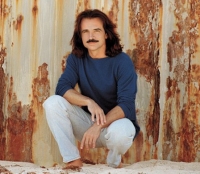
Yanni (born Yiannis Hrysomallis (pronounced Chrysomallis), (Greek: Γιάννης Χρυσομάλλης, classical transcription Giannis Chrysomallis), on November 14, 1954 in Kalamata, Greece) is a self-taught pianist, keyboardist, and composer. After receiving a B.A. in psychology, he would instead seek a life in music though he had no formal training and could not read a note.
He earned Grammy nominations for his 1992 album, Dare to Dream, and the 1993 follow-up, In My Time. His breakthrough success came with the 1994 release of Yanni Live at the Acropolis, deemed to be the second best-selling music video of all time, (behind Michael Jackson's video for Thriller with nine million units). Yanni has since performed live in concert before in excess of two million people in more than 20 countries around the world. He has accumulated more than 35 platinum and gold albums globally, with sales totaling over 20 million copies. Yanni is considered to be one of the top fundraisers of all time for public television. His compositions have been included in all Olympic Games television broadcasts since 1988, and his music has been used extensively in television and televised sporting events. His music is frequently described as "new age", though he prefers the term "contemporary instrumental". The regents of the University of Minnesota conferred upon Yanni the honorary degree of Doctor of Humane Letters.
He earned Grammy nominations for his 1992 album, Dare to Dream, and the 1993 follow-up, In My Time. His breakthrough success came with the 1994 release of Yanni Live at the Acropolis, deemed to be the second best-selling music video of all time, (behind Michael Jackson's video for Thriller with nine million units). Yanni has since performed live in concert before in excess of two million people in more than 20 countries around the world. He has accumulated more than 35 platinum and gold albums globally, with sales totaling over 20 million copies. Yanni is considered to be one of the top fundraisers of all time for public television. His compositions have been included in all Olympic Games television broadcasts since 1988, and his music has been used extensively in television and televised sporting events. His music is frequently described as "new age", though he prefers the term "contemporary instrumental". The regents of the University of Minnesota conferred upon Yanni the honorary degree of Doctor of Humane Letters.
Chopin

Frédéric Chopin (1 March 1810 – 17 October 1849) was a Polish composer and virtuoso pianist of the Romantic period. He is widely regarded as the greatest Polish composer, and ranks as one of music's greatest tone poets.
He was born in the village of Żelazowa Wola, in the Duchy of Warsaw, to a Polish mother and French-expatriate father, and in his early life was regarded as a child-prodigy pianist. In November 1830, at the age of 20, Chopin went abroad; following the suppression of the Polish November Uprising of 1830–31, he became one of many expatriates of the Polish "Great Emigration."
In Paris, he made a comfortable living as a composer and piano teacher, while giving few public performances. A Polish patriot,
Chopin's extant compositions were written primarily for the piano as a solo instrument. Though technically demanding, Chopin's style emphasizes nuance and expressive depth rather than virtuosity. Chopin invented musical forms such as the ballade and was responsible for major innovations in forms such as the piano sonata, waltz, nocturne, étude, impromptu and prelude. His works are mainstays of Romanticism in 19th-century classical music.
He was born in the village of Żelazowa Wola, in the Duchy of Warsaw, to a Polish mother and French-expatriate father, and in his early life was regarded as a child-prodigy pianist. In November 1830, at the age of 20, Chopin went abroad; following the suppression of the Polish November Uprising of 1830–31, he became one of many expatriates of the Polish "Great Emigration."
In Paris, he made a comfortable living as a composer and piano teacher, while giving few public performances. A Polish patriot,
Chopin's extant compositions were written primarily for the piano as a solo instrument. Though technically demanding, Chopin's style emphasizes nuance and expressive depth rather than virtuosity. Chopin invented musical forms such as the ballade and was responsible for major innovations in forms such as the piano sonata, waltz, nocturne, étude, impromptu and prelude. His works are mainstays of Romanticism in 19th-century classical music.
Stephen Foster
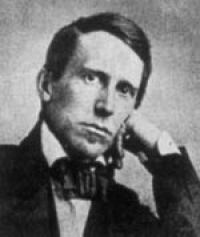
Stephen Collins Foster (July 4, 1826 – January 13, 1864), known as the "father of American music," was the pre-eminent songwriter in the United States of the 19th century. His songs, such as "Oh! Susanna", "Camptown Races", "Old Folks at Home" ("Swanee River"), "Hard Times Come Again No More", "My Old Kentucky Home", "Old Black Joe", and "Beautiful Dreamer", remain popular over 150 years after their composition.
Stephen Foster was inducted into the Songwriters Hall of Fame in 1970.
"My Old Kentucky Home" is the official state song of Kentucky, adopted by the General Assembly on March 19, 1928. "Old Folks at Home" is the official state song of Florida, designated in 1935.
The melody of Foster's "Old Dog Tray" is incorporated into Puccini's opera La Fanciulla del West (as the aria Che faranno).
Eighteen of Foster's compositions were recorded and released on the Beautiful Dreamer: The Songs of Stephen Foster collection. Among the artists that are featured on the album are John Prine, Alison Krauss, Yo Yo Ma, Roger McGuinn, Mavis Staples and Suzy Bogguss. The album won the Grammy for Best Traditional Folk Album in 2005.
Douglas Jimerson, a tenor from Baltimore who has released CD's of music from the Civil War era, released Stephen Foster's America in 1998.
American singer-songwriter Chris Stuart penned and recorded "Dear Friends and Gentle Hearts," a mournful song about Foster's sad fate.
American classical composer Charles Ives freely quoted a wide variety of Foster's songs in many of his own works.
A Squirrel Nut Zippers song titled "The Ghost of Stephen Foster" features references to his most famous works, including "Camptown Races".
Stephen Foster was inducted into the Songwriters Hall of Fame in 1970.
"My Old Kentucky Home" is the official state song of Kentucky, adopted by the General Assembly on March 19, 1928. "Old Folks at Home" is the official state song of Florida, designated in 1935.
The melody of Foster's "Old Dog Tray" is incorporated into Puccini's opera La Fanciulla del West (as the aria Che faranno).
Eighteen of Foster's compositions were recorded and released on the Beautiful Dreamer: The Songs of Stephen Foster collection. Among the artists that are featured on the album are John Prine, Alison Krauss, Yo Yo Ma, Roger McGuinn, Mavis Staples and Suzy Bogguss. The album won the Grammy for Best Traditional Folk Album in 2005.
Douglas Jimerson, a tenor from Baltimore who has released CD's of music from the Civil War era, released Stephen Foster's America in 1998.
American singer-songwriter Chris Stuart penned and recorded "Dear Friends and Gentle Hearts," a mournful song about Foster's sad fate.
American classical composer Charles Ives freely quoted a wide variety of Foster's songs in many of his own works.
A Squirrel Nut Zippers song titled "The Ghost of Stephen Foster" features references to his most famous works, including "Camptown Races".
Michael Jackson

Michael Joseph Jackson (August 29, 1958 – June 25, 2009) was an American singer, dancer and entertainer. Referred to as the King of Pop, he is the most commercially successful entertainer of all time, and one of the most influential. His contributions to music, dance and fashion, along with a much publicized personal life, made him a global figure in popular culture for over four decades.
Alongside his brothers, he made his debut as lead singer and youngest member of The Jackson 5 in 1964. He began his solo career in 1971. His 1982 album Thriller remains the best-selling album ever, with Off the Wall (1979), Bad (1987), Dangerous (1991) and HIStory (1995) also among the world's best-selling albums. He is widely credited with having transformed the music video from a promotional tool into an art form with videos for his songs such as "Billie Jean", "Beat It" and "Thriller" making him the first African American artist to amass a strong crossover following on MTV. With stage performances and music videos, Jackson popularized a number of physically complicated dance techniques, such as the robot and the moonwalk. His distinctive musical sound, vocal style, and choreography, is credited with stretching across and breaking down cultural, racial, economic, generational, and global barriers that has inspired countless pop, rock, R&B and hip hop artists.
One of the few artists to have been inducted into the Rock and Roll Hall of Fame twice, his other achievements feature multiple Guinness World Records—including the "Most Successful Entertainer of All Time"—15 Grammy Awards (including the "Living Legend Award" and the "Lifetime Achievement Award"), 26 American Music Awards (24 only as a solo artist, including one for "Artist of the Century")—more than any artist—, 17 number one singles in the US (including the four as a member of the Jackson 5), and estimated sales of up to 750 million records worldwide making him the world's best selling artist in history.
Jackson's personal relationships and life generated controversy for years. His changing appearance was noticed from the late 1970s onwards, with changes to his nose and to the color of his skin drawing media publicity. He was accused of child sexual abuse in 1993 though no charges were brought, and in 2005 he was tried and acquitted when the jury ruled him not guilty on all charges. He married twice, first in 1994 and again in 1996, and brought up three children, one born to a surrogate mother. While preparing for the This Is It concert tour in 2009, Jackson died at the age of 50 after suffering from cardiac arrest. He reportedly had been administered drugs such as propofol and lorazepam, and his death was ruled a homicide by the Los Angeles County coroner. His death triggered an outpouring of grief from around the world with his globally live broadcast memorial service attracting an audience of up to one billion people; as well as a huge surge in his album sales, resulting in him becoming the best selling artist of 2009 with sales in excess of 8.2 million in the United States where he became the first artist ever to have 4 of the top 20 best-selling albums in a single year, and 29 million albums globally, where he had an unprecedented 8 of the top 25 best-selling albums worldwide.
Alongside his brothers, he made his debut as lead singer and youngest member of The Jackson 5 in 1964. He began his solo career in 1971. His 1982 album Thriller remains the best-selling album ever, with Off the Wall (1979), Bad (1987), Dangerous (1991) and HIStory (1995) also among the world's best-selling albums. He is widely credited with having transformed the music video from a promotional tool into an art form with videos for his songs such as "Billie Jean", "Beat It" and "Thriller" making him the first African American artist to amass a strong crossover following on MTV. With stage performances and music videos, Jackson popularized a number of physically complicated dance techniques, such as the robot and the moonwalk. His distinctive musical sound, vocal style, and choreography, is credited with stretching across and breaking down cultural, racial, economic, generational, and global barriers that has inspired countless pop, rock, R&B and hip hop artists.
One of the few artists to have been inducted into the Rock and Roll Hall of Fame twice, his other achievements feature multiple Guinness World Records—including the "Most Successful Entertainer of All Time"—15 Grammy Awards (including the "Living Legend Award" and the "Lifetime Achievement Award"), 26 American Music Awards (24 only as a solo artist, including one for "Artist of the Century")—more than any artist—, 17 number one singles in the US (including the four as a member of the Jackson 5), and estimated sales of up to 750 million records worldwide making him the world's best selling artist in history.
Jackson's personal relationships and life generated controversy for years. His changing appearance was noticed from the late 1970s onwards, with changes to his nose and to the color of his skin drawing media publicity. He was accused of child sexual abuse in 1993 though no charges were brought, and in 2005 he was tried and acquitted when the jury ruled him not guilty on all charges. He married twice, first in 1994 and again in 1996, and brought up three children, one born to a surrogate mother. While preparing for the This Is It concert tour in 2009, Jackson died at the age of 50 after suffering from cardiac arrest. He reportedly had been administered drugs such as propofol and lorazepam, and his death was ruled a homicide by the Los Angeles County coroner. His death triggered an outpouring of grief from around the world with his globally live broadcast memorial service attracting an audience of up to one billion people; as well as a huge surge in his album sales, resulting in him becoming the best selling artist of 2009 with sales in excess of 8.2 million in the United States where he became the first artist ever to have 4 of the top 20 best-selling albums in a single year, and 29 million albums globally, where he had an unprecedented 8 of the top 25 best-selling albums worldwide.
The Rolling Stones

The Rolling Stones are an English band whose music was initially based on rhythm and blues and rock and roll. Formed in London and having their first success in the UK, they subsequently became popular in the US during the "British Invasion" in the early 1960s.
The band formed in 1962 when original leader Brian Jones and pianist Ian Stewart were joined by singer Mick Jagger as lead vocals and guitarist Keith Richards, whose songwriting partnership later contributed to their taking the leadership role in the group. Bassist Bill Wyman and drummer Charlie Watts completed the early lineup. Ian Stewart was removed from the official lineup in 1963 but continued to work with the band as road manager and keyboardist until his death in 1985.
The band's early recordings were mainly covers of American blues and R&B songs. Their 1965 single "(I Can't Get No) Satisfaction" established The Rolling Stones as a premier rock and roll act. Starting with their 1966 album Aftermath, the songs of Jagger and Richards, aided by the instrumental experimentation of Jones, expanded an always present stylistic flexibility. Jones died in 1969 shortly after being fired from the band and was replaced by Mick Taylor. Taylor recorded five albums with The Rolling Stones before quitting in 1974. Former Faces guitarist Ronnie Wood stepped in and has been with the band ever since. Wyman left the Rolling Stones in 1993; bassist Darryl Jones, who is not an official band member, has worked with the group since 1994.
The Rolling Stones have released 22 studio albums in the UK (24 in the US), eight concert albums (nine in the US) and numerous compilations; they have had 32 UK & US top-10 singles, 43 UK & US top-10 albums from 1964 and 2008 and have sold more than 200 million albums worldwide. 1971's Sticky Fingers began a string of eight consecutive studio albums at number one in the United States. In 1989 The Rolling Stones were inducted into the American Rock and Roll Hall of Fame, and in 2004 they were ranked number 4 in Rolling Stone magazine's 100 Greatest Artists of All Time. They are also ranked as the number 2 artists of all time on Acclaimedmusic.net. Their latest studio album, A Bigger Bang, was released in 2005 and followed by the highest-grossing tour in history, which lasted into late summer 2007. During the 1969 American tour, tour manager Sam Cutler introduced them as "The Greatest Rock and Roll Band in the World". Their image of unkempt and surly youth is one that many musicians still emulate.
The band formed in 1962 when original leader Brian Jones and pianist Ian Stewart were joined by singer Mick Jagger as lead vocals and guitarist Keith Richards, whose songwriting partnership later contributed to their taking the leadership role in the group. Bassist Bill Wyman and drummer Charlie Watts completed the early lineup. Ian Stewart was removed from the official lineup in 1963 but continued to work with the band as road manager and keyboardist until his death in 1985.
The band's early recordings were mainly covers of American blues and R&B songs. Their 1965 single "(I Can't Get No) Satisfaction" established The Rolling Stones as a premier rock and roll act. Starting with their 1966 album Aftermath, the songs of Jagger and Richards, aided by the instrumental experimentation of Jones, expanded an always present stylistic flexibility. Jones died in 1969 shortly after being fired from the band and was replaced by Mick Taylor. Taylor recorded five albums with The Rolling Stones before quitting in 1974. Former Faces guitarist Ronnie Wood stepped in and has been with the band ever since. Wyman left the Rolling Stones in 1993; bassist Darryl Jones, who is not an official band member, has worked with the group since 1994.
The Rolling Stones have released 22 studio albums in the UK (24 in the US), eight concert albums (nine in the US) and numerous compilations; they have had 32 UK & US top-10 singles, 43 UK & US top-10 albums from 1964 and 2008 and have sold more than 200 million albums worldwide. 1971's Sticky Fingers began a string of eight consecutive studio albums at number one in the United States. In 1989 The Rolling Stones were inducted into the American Rock and Roll Hall of Fame, and in 2004 they were ranked number 4 in Rolling Stone magazine's 100 Greatest Artists of All Time. They are also ranked as the number 2 artists of all time on Acclaimedmusic.net. Their latest studio album, A Bigger Bang, was released in 2005 and followed by the highest-grossing tour in history, which lasted into late summer 2007. During the 1969 American tour, tour manager Sam Cutler introduced them as "The Greatest Rock and Roll Band in the World". Their image of unkempt and surly youth is one that many musicians still emulate.
Alfredo Catalani

Alfredo Catalani was an Italian operatic composer. He is best remembered for his operas Loreley and La Wally. La Wally was composed to a libretto by Luigi Illica, and features Catalani's most famous aria "Ebben? Ne andrò lontana."
Johann Pachelbel

Johann Pachelbel (pronounced /ˈpækəlbɛl/, /ˈpɑːkəlbɛl/, or /ˈpɑːkəbɛl/; baptized September 1, 1653 – buried March 9, 1706) was a German Baroque composer, organist and teacher, who brought the south German organ tradition to its peak. He composed a large body of sacred and secular music, and his contributions to the development of the chorale prelude and fugue have earned him a place among the most important composers of the middle Baroque era.
Pachelbel's work enjoyed enormous popularity during his lifetime; he had many pupils and his music became a model for the composers of south and central Germany. Today, Pachelbel is best known for the Canon in D, the only canon he wrote - although a true canon at the unison in three parts, it is often regarded more as a passacaglia, and it is in this mode that it has been arranged and transcribed for many different media. In addition to the canon, his most well-known works include the Chaconne in F minor, the Toccata in E minor for organ, and the Hexachordum Apollinis, a set of keyboard variations.
Pachelbel's music was influenced by southern German composers, such as Johann Jakob Froberger and Johann Kaspar Kerll, Italians such as Girolamo Frescobaldi and Alessandro Poglietti, French composers, and the composers of the Nuremberg tradition. Pachelbel preferred a lucid, uncomplicated contrapuntal style that emphasized melodic and harmonic clarity. His music is less virtuosic and less adventurous harmonically than that of Dieterich Buxtehude, although, like Buxtehude, Pachelbel experimented with different ensembles and instrumental combinations in his chamber music and, most importantly, his vocal music, much of which features exceptionally rich instrumentation. Pachelbel explored many variation forms and associated techniques, which manifest themselves in various diverse pieces, from sacred concertos to harpsichord suites.
Pachelbel's work enjoyed enormous popularity during his lifetime; he had many pupils and his music became a model for the composers of south and central Germany. Today, Pachelbel is best known for the Canon in D, the only canon he wrote - although a true canon at the unison in three parts, it is often regarded more as a passacaglia, and it is in this mode that it has been arranged and transcribed for many different media. In addition to the canon, his most well-known works include the Chaconne in F minor, the Toccata in E minor for organ, and the Hexachordum Apollinis, a set of keyboard variations.
Pachelbel's music was influenced by southern German composers, such as Johann Jakob Froberger and Johann Kaspar Kerll, Italians such as Girolamo Frescobaldi and Alessandro Poglietti, French composers, and the composers of the Nuremberg tradition. Pachelbel preferred a lucid, uncomplicated contrapuntal style that emphasized melodic and harmonic clarity. His music is less virtuosic and less adventurous harmonically than that of Dieterich Buxtehude, although, like Buxtehude, Pachelbel experimented with different ensembles and instrumental combinations in his chamber music and, most importantly, his vocal music, much of which features exceptionally rich instrumentation. Pachelbel explored many variation forms and associated techniques, which manifest themselves in various diverse pieces, from sacred concertos to harpsichord suites.
Rachmaninoff

Sergei Vasilievich Rachmaninoff (1 April 1873 - 28 March 1943) was a Russian composer, pianist, and conductor. He was one of the finest pianists of his day and, as a composer, the last great representative of Russian late Romanticism in classical music. Early influences of Tchaikovsky, Rimsky-Korsakov and other Russian composers gave way to a thoroughly personal idiom which included a pronounced lyricism, expressive breadth, structural ingenuity and a tonal palette of rich, distinctive orchestral colors.
Understandably, the piano figures prominently in Rachmaninoff's compositional output, either as a solo instrument or as part of an ensemble. He made it a point, however, to use his own skills as a performer to explore fully the expressive possibilities of the instrument. Even in his earliest works, he revealed a sure grasp of idiomatic piano writing and a striking gift for melody. In some of his early orchestral pieces he showed the first signs of a talent for tone painting, which he would perfect in The Isle of the Dead, and he began to show a similar penchant for vocal writing in two early sets of songs, Opp. 4 and 8. Rachmaninoff's masterpiece, however, is his choral symphony The Bells, in which all of his talents are fused and unified.
Rachmaninoff sometimes felt threatened by the success of modernists such as Scriabin and Prokofiev and wondered whether to cease composing even before he left Russia. His musical philosophy was rooted in the Russian spiritual tradition, where the role of the artist was to create beauty and to speak the truth from the depths of his heart. In his last major interview, in 1941, he admitted his music, like Russian music, was a product of his temperament. He said, on another occasion, "The new kind of music seems to create not from the heart but from the head. Its composers think rather than feel. They have not the capacity to make their works exalt—they meditate, protest, analyze, reason, calculate and brood, but they do not exalt."
Understandably, the piano figures prominently in Rachmaninoff's compositional output, either as a solo instrument or as part of an ensemble. He made it a point, however, to use his own skills as a performer to explore fully the expressive possibilities of the instrument. Even in his earliest works, he revealed a sure grasp of idiomatic piano writing and a striking gift for melody. In some of his early orchestral pieces he showed the first signs of a talent for tone painting, which he would perfect in The Isle of the Dead, and he began to show a similar penchant for vocal writing in two early sets of songs, Opp. 4 and 8. Rachmaninoff's masterpiece, however, is his choral symphony The Bells, in which all of his talents are fused and unified.
Rachmaninoff sometimes felt threatened by the success of modernists such as Scriabin and Prokofiev and wondered whether to cease composing even before he left Russia. His musical philosophy was rooted in the Russian spiritual tradition, where the role of the artist was to create beauty and to speak the truth from the depths of his heart. In his last major interview, in 1941, he admitted his music, like Russian music, was a product of his temperament. He said, on another occasion, "The new kind of music seems to create not from the heart but from the head. Its composers think rather than feel. They have not the capacity to make their works exalt—they meditate, protest, analyze, reason, calculate and brood, but they do not exalt."
George Gershwin

George Gershwin (September 26, 1898 – July 11, 1937) was an American composer. He wrote most of his vocal and theatrical works in collaboration with his elder brother, lyricist Ira Gershwin. George Gershwin composed songs both for Broadway and for the classical concert hall. He also wrote popular songs with success.
Many of his compositions have been used on television and in numerous films, and many became jazz standards. The jazz singer Ella Fitzgerald recorded many of the Gershwins' songs on her 1959 Gershwin Songbook (arranged by Nelson Riddle). Countless singers and musicians have recorded Gershwin songs, including Fred Astaire, Louis Armstrong, Al Jolson, Bobby Darin, Art Tatum, Bing Crosby, Janis Joplin, John Coltrane, Frank Sinatra, Billie Holiday, Sam Cooke, Miles Davis, Herbie Hancock, Madonna, Judy Garland, Julie Andrews, Barbra Streisand, Marni Nixon, Natalie Cole, Patti Austin, Nina Simone, Maureen McGovern, John Fahey, The Residents, Than & Sam, Sublime, and Sting. A residential building is named after him on the Stony Brook University campus.
Many of his compositions have been used on television and in numerous films, and many became jazz standards. The jazz singer Ella Fitzgerald recorded many of the Gershwins' songs on her 1959 Gershwin Songbook (arranged by Nelson Riddle). Countless singers and musicians have recorded Gershwin songs, including Fred Astaire, Louis Armstrong, Al Jolson, Bobby Darin, Art Tatum, Bing Crosby, Janis Joplin, John Coltrane, Frank Sinatra, Billie Holiday, Sam Cooke, Miles Davis, Herbie Hancock, Madonna, Judy Garland, Julie Andrews, Barbra Streisand, Marni Nixon, Natalie Cole, Patti Austin, Nina Simone, Maureen McGovern, John Fahey, The Residents, Than & Sam, Sublime, and Sting. A residential building is named after him on the Stony Brook University campus.
Stephen Heller

Stephen Heller (Hungarian: Heller István) (15 May 1815 – 14 January 1888) was a Hungarian pianist, teacher and composer whose career spanned the period from Schumann to Bizet. Heller was an influence for later Romantic composers. He outlived his reputation, and was a near-forgotten figure at his death in 1888.
Music theory

Music theory is the study of the practices and possibilities of music. The Oxford Companion to Music describes three interrelated uses of the term "music theory"
Hugo Wong

Music Therapist (HCPC, UK), Piano and music theory tutor Wong's interest towards music started since the age of six, he then studied pianoforte at the age ...
Hisaishi Jou
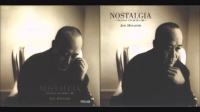
Mamoru Fujisawa (藤澤 守 Fujisawa Mamoru?), known professionally as Joe Hisaishi (久石 譲 Hisaishi Jō?, born December 6, 1950), is a composer and director known for over 100 film scores and solo albums dating back to 1981.
While possessing a stylistically distinct sound, Hisaishi's music has been known to explore and incorporate different genres, including minimalist, experimental electronic, European classical, and Japanese classical. Lesser known are the other musical roles he plays; he is also a typesetter, author, arranger, and head of an orchestra.
He is best known for his work with animator Hayao Miyazaki, having composed scores for many of his films including Nausicaä of the Valley of the Wind (1984), Castle in the Sky (1986), My Neighbor Totoro (1988), Kiki's Delivery Service (1989), Porco Rosso (1992), Princess Mononoke (1997), Spirited Away (2001), Howl's Moving Castle (2004) and Ponyo on the Cliff by the Sea (2008). He is also recognized for the soundtracks he has provided for filmmaker 'Beat' Takeshi Kitano, including A Scene at the Sea (1991), Dolls (2002), Kikujiro (1999), Hana-bi (1997), Kids Return (1996), Ocean Heaven (2010) and Sonatine (1993).
While possessing a stylistically distinct sound, Hisaishi's music has been known to explore and incorporate different genres, including minimalist, experimental electronic, European classical, and Japanese classical. Lesser known are the other musical roles he plays; he is also a typesetter, author, arranger, and head of an orchestra.
He is best known for his work with animator Hayao Miyazaki, having composed scores for many of his films including Nausicaä of the Valley of the Wind (1984), Castle in the Sky (1986), My Neighbor Totoro (1988), Kiki's Delivery Service (1989), Porco Rosso (1992), Princess Mononoke (1997), Spirited Away (2001), Howl's Moving Castle (2004) and Ponyo on the Cliff by the Sea (2008). He is also recognized for the soundtracks he has provided for filmmaker 'Beat' Takeshi Kitano, including A Scene at the Sea (1991), Dolls (2002), Kikujiro (1999), Hana-bi (1997), Kids Return (1996), Ocean Heaven (2010) and Sonatine (1993).
Scott Alan

cott Alan is an American songwriter who has released eight albums, beginning with his debut album Dreaming Wide Awake.[2
Guiseppe Verdi

Giuseppe Fortunino Francesco Verdi (Italian pronunciation: ; 10 October 1813 – 27 January 1901) was an Italian Romantic composer, mainly of opera. He was one of the most influential composers of the 19th century. His works are frequently performed in opera houses throughout the world and, transcending the boundaries of the genre, some of his themes have long since taken root in popular culture - such as "La donna è mobile" from Rigoletto, "Va, pensiero" (The Chorus of the Hebrew Slaves) from Nabucco, "Libiamo ne' lieti calici" (The Drinking Song) from La traviata and the "Grand March" from Aida. Although his work was sometimes criticized for using a generally diatonic rather than a chromatic musical idiom and having a tendency toward melodrama, Verdi’s masterworks dominate the standard repertoire a century and a half after their composition.
Verdi's predecessors who influenced his music were Rossini, Bellini, Giacomo Meyerbeer and, most notably, Gaetano Donizetti and Saverio Mercadante. With the exception of Otello and Aida, he was free of Wagner's influence. Although respectful of Gounod, Verdi was careful not to learn anything from the Frenchman whom many of Verdi's contemporaries regarded as the greatest living composer. Some strains in Aida suggest at least a superficial familiarity with the works of the Russian composer Mikhail Glinka, whom Franz Liszt, after his tour of the Russian Empire as a pianist, popularized in Western Europe.
Throughout his career, Verdi rarely utilised the high C in his tenor arias, citing the fact that the opportunity to sing that particular note in front of an audience distracts the performer before and after the note appears. However, he did provide high Cs to Duprez in Jérusalem and to Tamberlick in the original version of La forza del destino. The high C often heard in the aria Di quella pira does not appear in Verdi's score.
Verdi's predecessors who influenced his music were Rossini, Bellini, Giacomo Meyerbeer and, most notably, Gaetano Donizetti and Saverio Mercadante. With the exception of Otello and Aida, he was free of Wagner's influence. Although respectful of Gounod, Verdi was careful not to learn anything from the Frenchman whom many of Verdi's contemporaries regarded as the greatest living composer. Some strains in Aida suggest at least a superficial familiarity with the works of the Russian composer Mikhail Glinka, whom Franz Liszt, after his tour of the Russian Empire as a pianist, popularized in Western Europe.
Throughout his career, Verdi rarely utilised the high C in his tenor arias, citing the fact that the opportunity to sing that particular note in front of an audience distracts the performer before and after the note appears. However, he did provide high Cs to Duprez in Jérusalem and to Tamberlick in the original version of La forza del destino. The high C often heard in the aria Di quella pira does not appear in Verdi's score.
Zorro Musical

Zorro is a musical with music by the Gipsy Kings and John Cameron, a book by Stephen Clark and Helen Edmundson, and lyrics by Stephen Clark. It is inspired by the 2005 fictional biography Zorro, the first original story of the pulp hero Zorro, written by Chilean author Isabel Allende (itself a prequel to the events of the original Zorro story which is the 1919 novella The Curse of Capistrano by Johnston McCulley, but excludes the mute butler Bernardo). It also contains numerous references to earlier Zorro-related works, especially the 1998 film The Mask of Zorro. The original musical did a trial run tour which proved to be successful, and led to a transfer to the West End (which included some minor changes such as the recasting of the roles of Luisa and Ramon).
Kurt Rosenwinkel

Kurt Rosenwinkel (born October 28, 1970) is an American jazz guitarist.A native of Philadelphia, Rosenwinkel attended the Philadelphia High School for the Creative and Performing Arts. He studied at Berklee College of Music for two and a half years before leaving in his third year to tour with Gary Burton, the dean of the school at the time. After moving to Brooklyn, he began performing with Human Feel, Paul Motian's Electric Bebop Band, Joe Henderson, and the Brian Blade Fellowship.
Michael Card

Michael Card (born April 11, 1957) is an American, Christian singer-songwriter, musician, author, and radio host from Franklin, Tennessee. He is best known for his contributions in contemporary Christian music, which combine folk-style melodies and instrumentation with an in-depth study of the Bible. Since his debut in 1981, Card has sold more than 4 million albums and has written 19 No. 1 singles. He has also authored several books, including the Gold Medallion Book Award winner, A Sacred Sorrow.
John Philip Sousa

John Philip Sousa (November 6, 1854 – March 6, 1932) was an American composer and conductor of the late Romantic era known particularly for American military and patriotic marches. Because of his mastery of march composition and resultant prominence, he is known as "The March King". In public he was typically referenced by his full name.
Ludwig van Beethoven

Ludwig van Beethoven (/ˈlʊdvɪɡ væn ˈbeɪt(h)oʊvən/ (About this soundlisten); German: (About this soundlisten); baptised 17 December 1770 – 26 March 1827) was a German composer and pianist. A crucial figure in the transition between the classical and romantic eras in classical music, he remains one of the most recognized and influential musicians of this period, and is considered to be one of the greatest composers of all time.
Beethoven was born in Bonn, the capital of the Electorate of Cologne, and part of the Holy Roman Empire. He displayed his musical talents at an early age and was vigorously taught by his father Johann van Beethoven, and was later taught by composer and conductor Christian Gottlob Neefe. At age 21, he moved to Vienna and studied composition with Joseph Haydn. Beethoven then gained a reputation as a virtuoso pianist, and was soon courted by Prince Lichnowsky for compositions, which resulted in Opus 1 in 1795.
Beethoven was born in Bonn, the capital of the Electorate of Cologne, and part of the Holy Roman Empire. He displayed his musical talents at an early age and was vigorously taught by his father Johann van Beethoven, and was later taught by composer and conductor Christian Gottlob Neefe. At age 21, he moved to Vienna and studied composition with Joseph Haydn. Beethoven then gained a reputation as a virtuoso pianist, and was soon courted by Prince Lichnowsky for compositions, which resulted in Opus 1 in 1795.
Pink Floyd
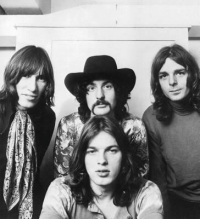
Pink Floyd are an English rock band from Cambridge. The band initially earned recognition for their psychedelic and space rock music, and, as they evolved, for their progressive rock music. Pink Floyd are known for philosophical lyrics, sonic experimentation, innovative album cover art, and elaborate live shows. One of rock music's most successful acts, the group have sold over 200 million albums worldwide including 74.5 million albums in the United States alone. Pink Floyd have influenced progressive rock artists of the 1970s such as Genesis and Yes; and contemporary artists such as Nine Inch Nails and Dream Theater.
Pink Floyd had moderate mainstream success and were one of the most popular bands in the London underground music scene in the late 1960s as a psychedelic band led by Syd Barrett. However, Barrett's erratic behaviour eventually forced his colleagues to replace him with guitarist and singer David Gilmour. After Barrett's departure, singer and bass player Roger Waters gradually became the dominant and driving force in the group by the late-1970s, until his eventual departure from the group in 1985. The band recorded several albums, achieving worldwide success with The Dark Side of the Moon (1973), Wish You Were Here (1975), Animals (1977), and The Wall (1979).
In 1985, Waters declared Pink Floyd "a spent force", but the remaining members, led by Gilmour, continued recording and touring under the name Pink Floyd. Waters sued them for the name and eventually they reached a settlement out of court, under which Gilmour, Mason and Wright would continue as Pink Floyd. They again enjoyed worldwide success with A Momentary Lapse of Reason (1987) and The Division Bell (1994). Waters performed with the band for the first time in 24 years on 2 July 2005 at the London Live 8 concert.
Pink Floyd had moderate mainstream success and were one of the most popular bands in the London underground music scene in the late 1960s as a psychedelic band led by Syd Barrett. However, Barrett's erratic behaviour eventually forced his colleagues to replace him with guitarist and singer David Gilmour. After Barrett's departure, singer and bass player Roger Waters gradually became the dominant and driving force in the group by the late-1970s, until his eventual departure from the group in 1985. The band recorded several albums, achieving worldwide success with The Dark Side of the Moon (1973), Wish You Were Here (1975), Animals (1977), and The Wall (1979).
In 1985, Waters declared Pink Floyd "a spent force", but the remaining members, led by Gilmour, continued recording and touring under the name Pink Floyd. Waters sued them for the name and eventually they reached a settlement out of court, under which Gilmour, Mason and Wright would continue as Pink Floyd. They again enjoyed worldwide success with A Momentary Lapse of Reason (1987) and The Division Bell (1994). Waters performed with the band for the first time in 24 years on 2 July 2005 at the London Live 8 concert.
John Miles

John Miles (born John Errington, 23 April 1949, Jarrow, Tyne & Wear, England) is an English rock music vocalist, songwriter, guitarist and keyboard player, best known for his 1976 Top 3 UK hit single, "Music".
Kurt Weill
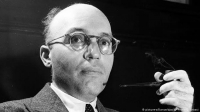
Kurt Julian Weill was a German Jewish composer, active from the 1920s in his native country, and in his later years in the United States. He was a leading composer for the stage who was best known for his fruitful collaborations with Bertolt Brecht.
Michel Polnareff

Michel Polnareff, born in Nérac (Lot-et-Garonne) on 3 July 1944, is a French singer-songwriter who was very popular from the mid-1960s until the early 1980s. While his commercial success is considerably smaller nowadays, he is still active and critically respected.
Otis Redding

tis Ray Redding Jr. (September 9, 1941 – December 10, 1967) was an American singer and songwriter. He is considered one of the greatest singers in the history of American popular music and a seminal artist in soul music and rhythm and blues. Redding's style of singing gained inspiration from the gospel music that preceded the genre. His singing style influenced many other soul artists of the 1960s.
Tenmon
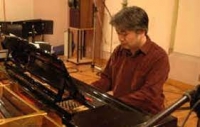
Tenmon (天門), born Atsushi Shirakawa (白川 篤史, Shirakawa Atsushi), is a Japanese music composer from Tokyo, Japan born October 4, 1971. He worked in the Nihon Falcom Corporation as one of the members of Falcom Sound Team J.D.K.. During his time with Falcom, he has composed much music for Falcom games, most notably Brandish.
Having known Makoto Shinkai as a coworker in Minori he has composed music for Shinkai's works since She and Her Cat. He is perhaps best known for creating the soundtracks for Shinkai's subsequent works, Voices of a Distant Star, The Place Promised in Our Early Days, 5 Centimeters Per Second and his final Shinkai collaboration being Children Who Chase Lost Voices from Deep Below.
Having known Makoto Shinkai as a coworker in Minori he has composed music for Shinkai's works since She and Her Cat. He is perhaps best known for creating the soundtracks for Shinkai's subsequent works, Voices of a Distant Star, The Place Promised in Our Early Days, 5 Centimeters Per Second and his final Shinkai collaboration being Children Who Chase Lost Voices from Deep Below.
Jean-Baptiste Lully
Jean-Baptiste Lully (UK: /ˈlʊli/, US: /luːˈliː/; French: ; born Giovanni Battista Lulli, Italian: ; 28 November 1632 – 22 March 1687) was an Italian-born French composer, instrumentalist, and dancer who is considered a master of the French Baroque music style. Best known for his operas, he spent most of his life working in the court of Louis XIV of France and became a French subject in 1661.
Dean Martin

Dean Martin (born Dino Paul Crocetti; June 7, 1917 – December 25, 1995) was an American singer, film actor, television personality, and comedian. He was one of the most well known musical artists of the 1950s and 1960s. Martin's hit singles included the songs "Memories Are Made Of This", "That's Amore", "Everybody Loves Somebody", "Mambo Italiano", "Sway", "Volare" and "Ain't That A Kick In The Head?". One of the organizers of The Rat Pack, he was a major star in four areas of show business: concert stage, recordings, motion pictures, and television.
Şebnem Ferah

Şebnem Ferah is a Turkish singer, songwriter, composer, and guitarist. She was the lead vocalist of the all-female hard rock band Volvox until 1994, after which she went on to pursue an illustrious solo career.
Antonio Carlos Jobim

Antonio Carlos Brasileiro de Almeida Jobim (January 25, 1927 in Rio de Janeiro – December 8, 1994 in New York City), also known as Tom Jobim, was a Grammy Award-winning Brazilian songwriter, composer, arranger, singer, and pianist/guitarist. A primary force behind the creation of the bossa nova style, Jobim is acknowledged as one of the most influential popular composers of the 20th century. His songs have been performed by many singers and instrumentalists within Brazil and internationally.
Roland Orzabal

Roland Jaime Orzabal de la Quintana (born 22 August 1961) is an English musician. He is a co-founder, main songwriter and joint vocalist of Tears for Fears, and has also produced other artists.
Pavel Chesnokov

Pavel Grigorievich Chesnokov (Russian: Пáвел Григóрьевич Чеснокóв) (24 October 1877, Voskresensk, Zvenigorod uyezd, Moscow Governorate – 14 March 1944, Moscow), also transliterated Tschesnokoff, Tchesnokov, Tchesnokoff, and Chesnokoff, was an Imperial Russian and Soviet composer, choral conductor and teacher. He composed over five hundred choral works, over four hundred of which are sacred. Today, he is most known for his piece Salvation is Created as well as works such as Do Not Reject Me in Old Age (solo for basso profondo) and movements from various settings of the Divine Liturgy of St John Chrysostom.
Horace Silver
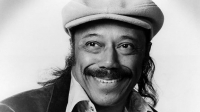
Horace Ward Martin Tavares Silver was an American jazz pianist, composer, and arranger, particularly in the hard bop style that he helped pioneer in the 1950s. After playing tenor saxophone and piano at school in Connecticut, Silver got his break on piano when his trio was recruited by Stan Getz in 1950.
Candy dulfer

Candy Dulfer is a Dutch jazz and pop saxophonist. She is the daughter of jazz saxophonist Hans Dulfer. She began playing at age six and founded her band Funky Stuff when she was fourteen. Her debut album Saxuality received a Grammy nomination.
 Sheet Music Giant is a site for those who wants to access popular sheet music easily,
letting them download the sheet music for free for trial purposes.
It's completely free to download and try the listed sheet music, but you have to delete the files after 24 hours of trial.
Don't forget, if you like the piece of music you have just learned playing,
treat the artist with respect, and go buy the original sheet music.
Sheet Music Giant is a site for those who wants to access popular sheet music easily,
letting them download the sheet music for free for trial purposes.
It's completely free to download and try the listed sheet music, but you have to delete the files after 24 hours of trial.
Don't forget, if you like the piece of music you have just learned playing,
treat the artist with respect, and go buy the original sheet music.
